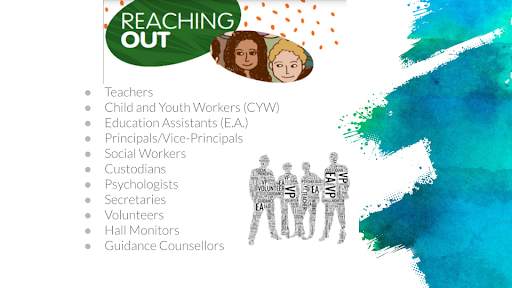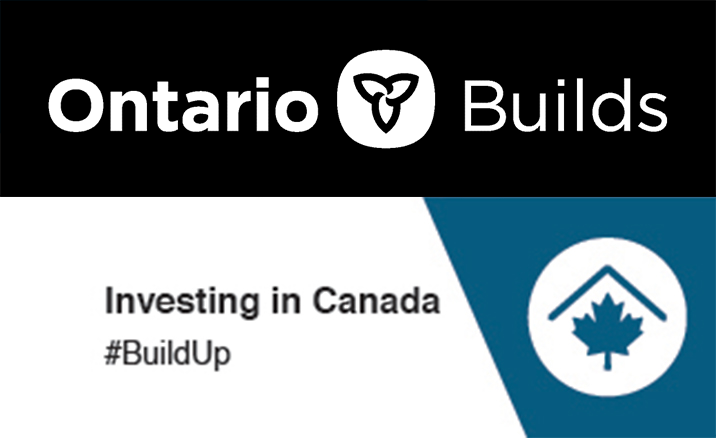Here at the WRDSB, we centre students and recognize the importance of having connections and resources to support their mental well-being. We know that breaking the cycle of mental health stigma among our students continues to be a daily challenge. We have cultivated and continue to seek out resources to not only educate but to ensure students have the information they need to maintain good mental health.
We know that when students need help, it is vital that they are aware of the people in their schools that can help them. Below is a list of people that can help our students at school.

If you are worried about your own or a friend’s well-being or mental health, please reach out to one of the resources listed above and connect with their teacher, school staff, or a trusted adult for support.
Here 24/7 is your front door to the addictions, mental health, and crisis services provided by 11 agencies across Waterloo Wellington. They do the intake, assessment, referral, crisis, waitlist and appointment booking work for these important programs. In Crisis or Need Support? Call 1-844-HERE247 (1-844-437-3247) anytime.
Kids Help Phone is Canada’s only 24/7 e-mental health service offering free, confidential support to kids, teens and young adults in English and French. Start a confidential conversation with a real person you can trust by calling 1-800-668-6868 or texting 686868.
Suicide Prevention
Tell someone if you have concerns or thoughts about suicide.
- Call the crisis line (1-844-437-3247)
- Call 911 if it is an emergency
Additional resources:
- I need help now from Waterloo Region Suicide Prevention Council.
Mental Health Services & Resources
The WRDSB Psychology Services Department’s Youtube Channel features videos on a variety of mental health and wellness topics
Psyki-Quarters is a student-led website that invites other students to explore and get resources and connect to their well-being.
Reach out – This guide is through Jack.org and is a tip sheet to look at how students can reach out and ask for help.
Jack.org – This poster mentions the golden rules of “being there” for someone struggling with mental health.
Mindyourmind.ca exists in the space where mental health, wellness, engagement and technology meet. We work with young people aged 14 to 29 to co-create interactive tools and innovative resources to build capacity and resilience.
Black Youth Helpline serves all youth and specifically responds to the need for a Black youth-specific service, positioned and resourced to promote access to professional, culturally appropriate support for youth, families and schools.
Kind Minds Family Wellness is an organization made up of 15 Black professionals that provide culturally relevant, identity-affirming support to our community. They specialize in Afrocentric/culturally-grounded counselling, education, employment and research advocacy.
Coalition of Muslim Women is an organization that provides opportunities for personal and professional growth, and leadership and skills development for women, while addressing issues of gender-based violence, racism, discrimination and Islamophobia.
Muslim Social Services Waterloo Region is an organization that offers spiritually and culturally sensitive humanitarian and social services to the Muslim and non-Muslim communities of the Waterloo Region.
OK2BME.ca is operated by KW Counselling Services. This program provides supportive services for 2LGBTQIA+ identified children, teens and their families.
Spectrum is an organization that serves, affirms, and supports the well-being of 2SLGBTQ+ individuals in Waterloo Region and the community.
Trans Lifeline is a grassroots hotline run by and for trans people. Trans Lifeline offers direct emotional and financial support to trans people in crisis – for the trans community, by the trans community.
White Owl Native Ancestry Association is dedicated to innovative Indigenous Wholistic practice with a commitment to whole-person development within the family and community. They offer individual, couple and family counselling as well as outreach programs along with land-based teachings and programs.
Qualia Counselling offers a variety of mental health therapies for children and families. They also provide culturally responsive counselling of varying identities and cultural contexts.
The Counselling Works! brochure contains information on the Counselling Collaborative Program, a free counselling service for those who are receiving support through Ontario Works or Ontario Disability Support Program.
Additional Resources
School Mental Health Ontario (SMHO) Resources
SMHO works together with Ontario school districts to support student mental health. SMHO has a youth group called THRIVE, which includes the participation of one of our very own WRDSB students. THRIVE has created several resources in the past year to attend to student mental health issues.
The SMHO website also has a section dedicated to general student mental health needs and outlines your role as a student in creating positive mental health in your school community, and outlines how to take action and use resources to help with this as well as taking care of your own mental health.
There is a resource on how to reach out for help as well as how to respond to a friend who may be struggling with mental health issues.
Also, check out these tips on using grounding techniques to help you manage overwhelming emotions.
Self Care and Self Awareness Guide | Starts With Me
Starts With Me’s Self Care and Self Awareness Guide provides everyday practices to improve wellbeing, promote resilience, and nurture self-compassion. The contents of this guide will help you follow a path of self-awareness, self-compassion, and emotional wellbeing that will help you cultivate good mental health.
Mental Health Literacy
Mental Health Literacy is designed to help improve the mental health of youth using the best scientific evidence available to enhance the understanding of adolescent mental health.
Studying Tips
Remembering is a tricky business. We can remember some things easily yet cannot seem to remember other things. We remember some things throughout our lives, while others things seem to come in one door in our mind and go out the other. There is no “magic pill” for remembering. But here are some tips that can help.
Building Resiliency
Raising Resilient Children and Youth by CAMH
Get more information on child/youth resilience. Everyone needs skills and supportive people in their lives to help cushion them from problems they may encounter. Introducing even a few positive elements into their lives can shift the balance and help many children and youth flourish.
Resiliency: at Home, School and Work by the CMHA
This short guide, created by the Canadian Mental Health Association, aims to assist parents with building resiliency in their children. Resiliency in children helps them solve problems, cope with challenges and bounce back from disappointments. We can help our children develop attributes or “assets” that enable them to be resilient and will help them throughout their lives.
Teens Can be Resilient…in High School!: A Parent’s Guide by Durham Region Health Department
Produced by the Durham Region Health Department, Teens Can be Resilient…in High School!: A Parent’s Guide was created as a mental health resource for parents of teens transitioning to high school. Entering high school can be a challenging time for both teens and parents. The teenage years are a time when many physical, emotional and social changes are occurring. Teens often experience a range of emotions, as do parents.
Five Science-Backed Strategies to Build Resilience by the Greater Good Science Center
Even for the relatively self-aware and emotionally adept, struggles can take us by surprise. But learning healthy ways to move through adversity—a collection of skills that researchers call resilience—can help us cope better and recover more quickly, or at least start heading in that direction. The Greater Good Science Center has collected 12 of those resilience practices (squeezed into five categories), which can help you confront emotional pain more skillfully.
mindyourmind by the Ministry of Health and Long-Term Care
mindyourmind.ca is an award-winning, non-profit mental health program that engages youth, emerging adults and the professionals who serve them to co-develop reliable and relevant resources. These resources are designed to reduce the stigma associated with mental illness and increase access and use of community support, both professional and peer-based. Through the use of active engagement, best practice and technology, mindyourmind inspires youth to reach out, get help and give help.
Emotionally Preparing your Kids for College or University by the Child Mind Institute
Adolescents making the transition from high school to college need not only academic skills to ace the classwork, and time-management skills to stay afloat, but emotional problem-solving skills to handle the challenges. As parents, we can’t shadow them in the freshman dorm, but we can help supply them, before they leave home, with a toolbox of skills and habits to use when they become stressed or overwhelmed.
Positive Psychology by Dr. Barbara L. Fredrickson
This free course discusses research findings in the field of positive psychology, conducted by Barbara Fredrickson and her colleagues. It also features practical applications of this science that you can put to use immediately to help you live a full and meaningful life. Only available in English at this time, with subtitles. Requires 2-4 hours/week for readings and watching videos.

